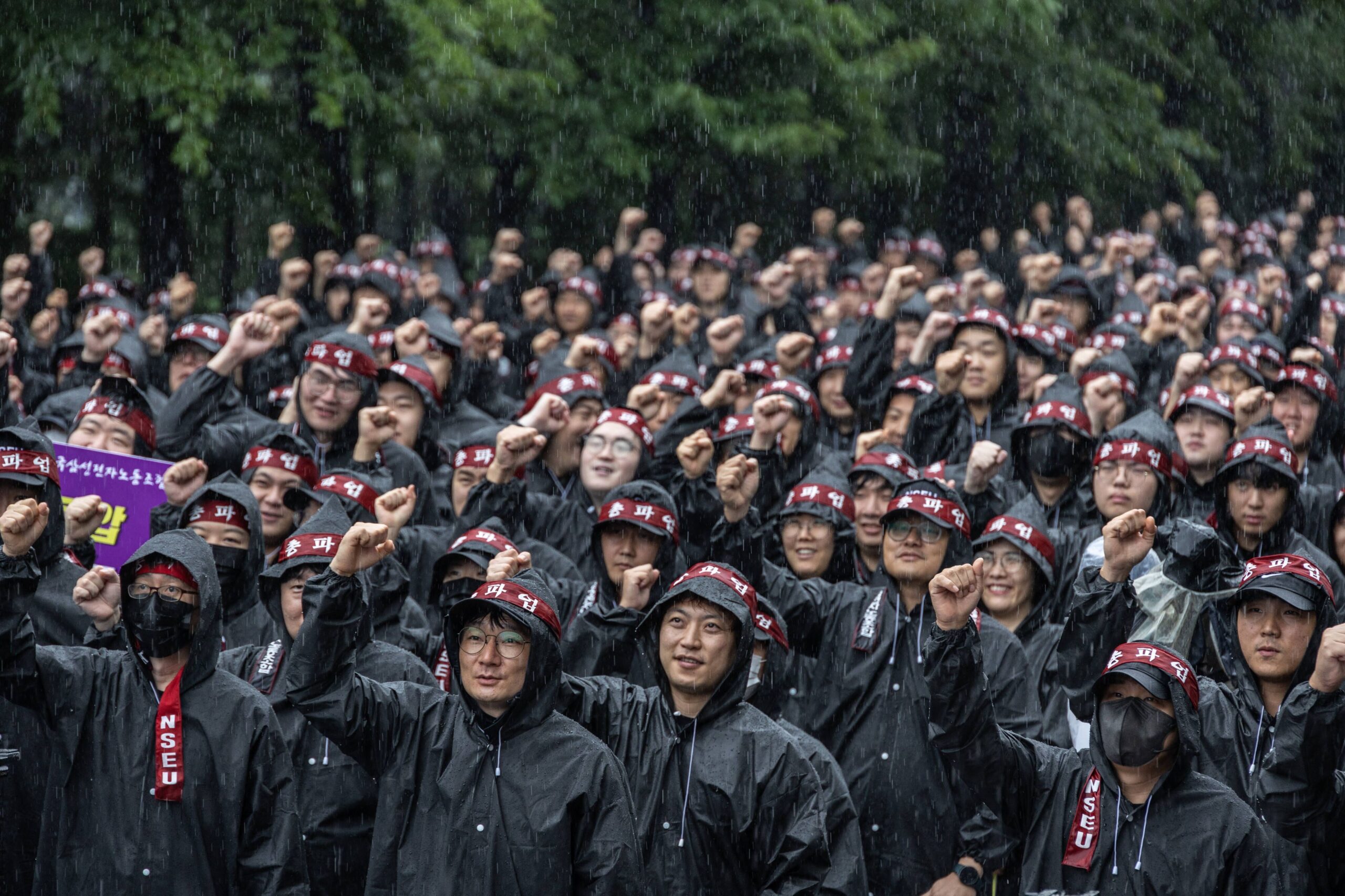
(Bloomberg) — Samsung Electronics Co.’s largest union is now calling on employees at one of the company’s most advanced AI memory chip plants to walk off the job, switching tactics after their campaign for higher pay showed signs of losing steam.
Most Read from Bloomberg
Several hundred employees joined protests Thursday and Friday in front of Samsung’s high-bandwidth memory site in Pyeongtaek, south of Seoul, after the union called a general strike this week. That’s a far cry from the thousands that turned up at a public rally outside of Samsung’s main facility in Hwaseong Monday, but union leaders told Bloomberg News they’re now targeting a small but strategically important complex in hopes of amping up the pressure.
The Pyeongtaek site is the nerve center for Samsung’s efforts to carve out a slice of an important market. The chipmaker’s in the process of trying to convince Nvidia Corp. to use its high-bandwidth memory — a prerequisite for it to catch smaller rival SK Hynix Inc. in the booming AI arena.
Targeting the high-end chip production line is “the most effective” measure against management, said Lee Hyun-kuk, deputy secretary-general of the union.
Shares of Samsung fell as much as 4% in Seoul on Friday, their biggest intraday decline in more than two months amid a broader selloff in Asian technology stocks.
Despite the dwindling numbers, this week’s string of walkouts and protests marked the biggest and most widespread labor protests in Samsung’s half-century history. Its biggest labor union of more than 30,000 workers declared a general strike Thursday — a surprise move that raised the risk of production disruption. Samsung has repeatedly said since Monday that impact so far on production has been minimal.
“Samsung Electronics remains committed to engaging in good faith negotiations with the union,” the chipmaker said in a statement, adding it hopes to resume talks soon. “The company currently is producing as planned, and has not incurred any problems meeting or responding to customer needs.”
It’s unclear how many in total will eventually respond to the union’s call, but the concern is that the escalating action may snowball and hurt the country’s best-known corporation, or trigger similar responses across a recovering tech and chip industry.
On Thursday, Son Woo-mok, head of the National Samsung Electronics Union, told Bloomberg Television he was getting reports of significant disruptions at factories where equipment lay idle after staff downed tools. But he wouldn’t estimate how many workers may eventually join a general strike.
“The company is saying that there is no production disruption, but that’s not true,” Son said. “I’m hearing that there’s a lot of equipment that’s shutting down, but they don’t have the manpower to handle it. So there’s a lot of equipment that’s going idle.”
The labor union’s previously said it would first target production lines that use 8-inch silicon wafers and rely more on human labor. Such early-generation manufacturing lines account for a small part of Samsung’s total semiconductor output.
Much of the company’s overall production is automated, though the company can ill-afford manufacturing snarls in coming weeks.
Shares of Samsung fell 3.7% on Friday. They had been largely unchanged the previous day, after the union called a general strike. Son however said there could be internal issues that haven’t emerged.
“When you’re producing semiconductor parts, obviously you have to do inspections and things like that,” Son said. “And there’s a lot of that backlog right now, so there’s definitely going to be quality issues.”
–With assistance from Katria Alampay, Lauren Faith Lau and Yoolim Lee.
Most Read from Bloomberg Businessweek
©2024 Bloomberg L.P.
EMEA Tribune is not involved in this news article, it is taken from our partners and or from the News Agencies. Copyright and Credit go to the News Agencies, email news@emeatribune.com Follow our WhatsApp verified Channel





